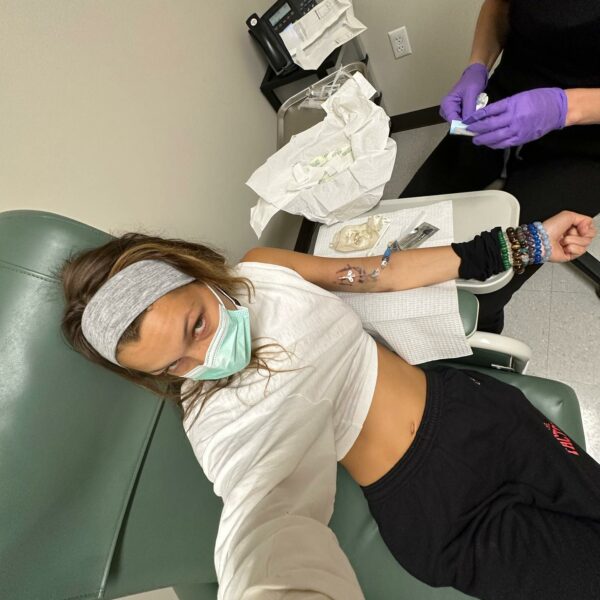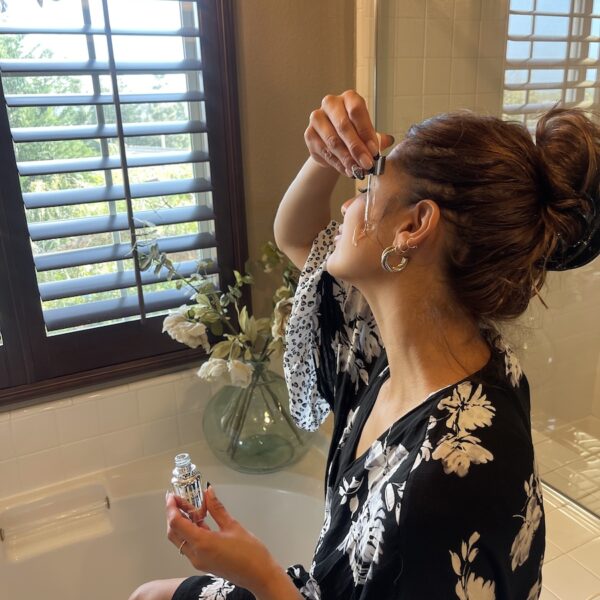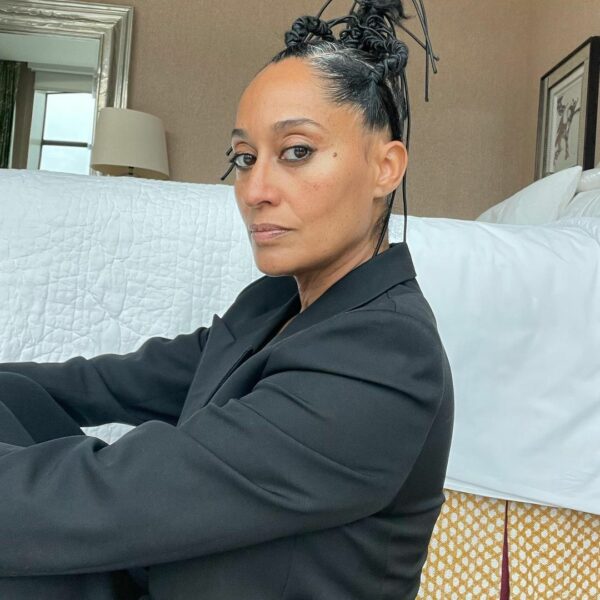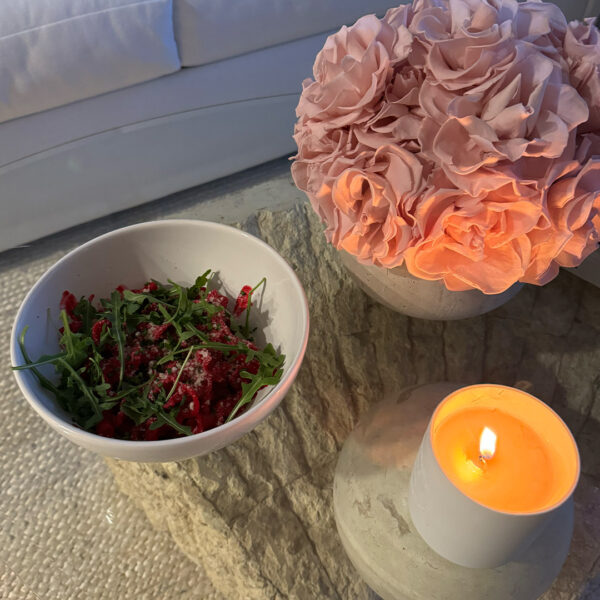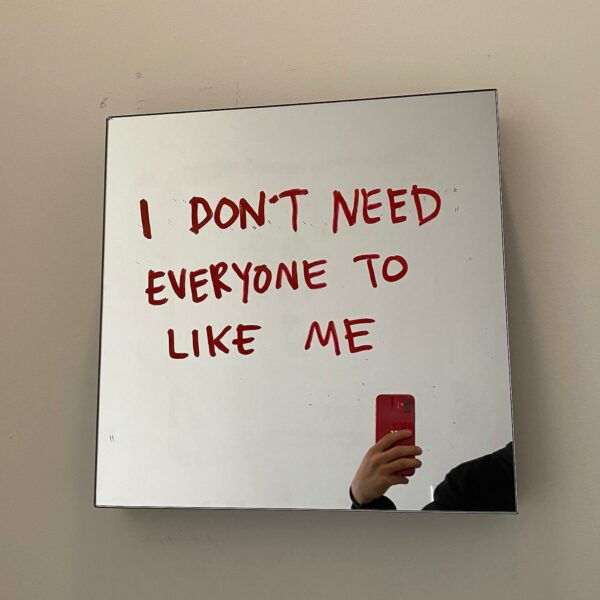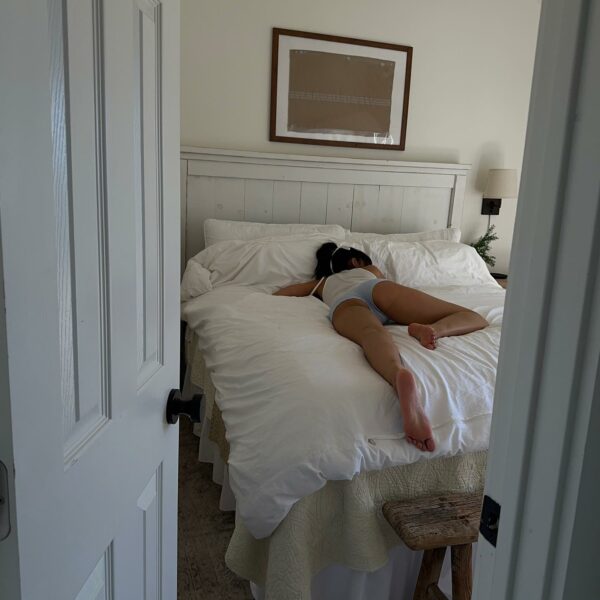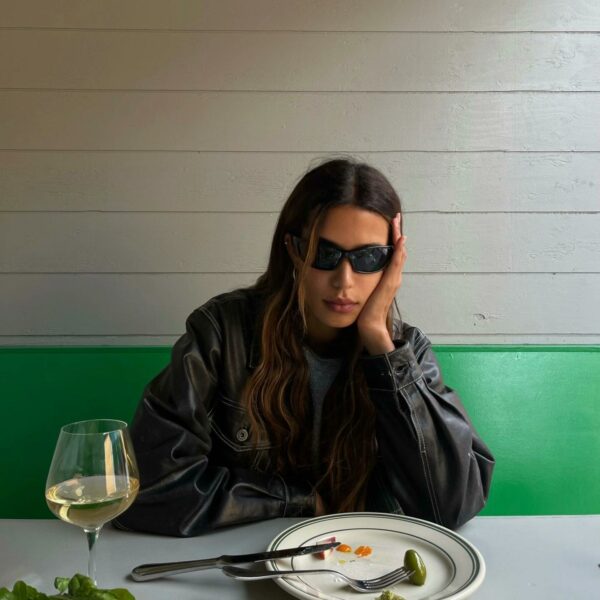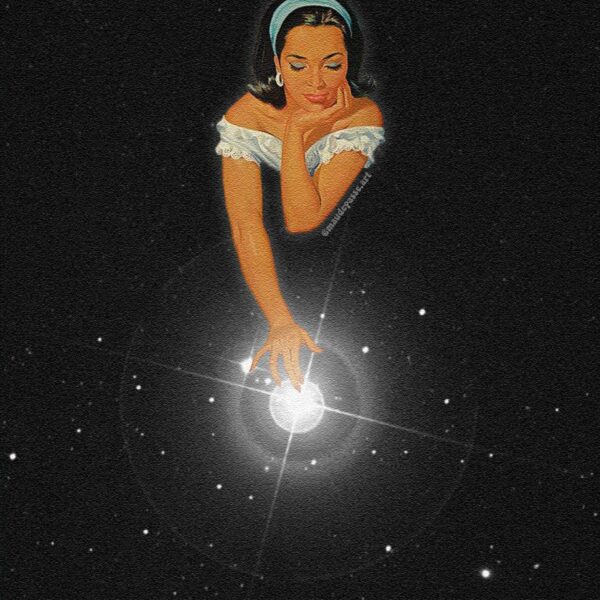I started drinking again after a four-year period of abstinence. This round of “exploration” began with me sipping a Kir Royal surrounded by my girlfriends in the elegance of The Four Seasons Hotel … and it ended 22 months later, among derelicts in a Vegas jail, strung out on methamphetamine, watching my mugshot and arrest be the lead news story on a guard’s TV.
When I was released, I was taken to a generic, pedestrian rehab, as the fancy one in Malibu had no available beds, and I was livid: “I’m the wife of…!” No one there cared. Neither did I really at that point. I couldn’t even sell the false indignation anymore, nor the tired conviction that I knew what I was doing. Something in me finally surrendered to this reckoning, and to being pared down to just a broken girl leaving all her smoke and mirrors at the door so she could possibly survive this ordeal. Maybe this was it. What I had been asking for. I felt intense resistance mixed with a slight glimmer of hope.
That day, 16 and a half years ago, was the last time I vacillated around my sobriety. I have been sober since then, 2003—not a drink or a drug—nothing mind-altering. And that’s a miracle: not in the woo-woo way, although I am plenty that, but literally, in the truest sense of a miracle. I couldn’t stop my alcoholism no matter how hard I tried, bargained, negotiated, pleaded with myself day after day, to the point where I thought I might not stay here on this planet, the pain being so great. And then it suddenly ended, from one day to the next. I got a reprieve. That somehow feels miraculous.
Here’s the part, at the intersection of willingness and grace, where I tell you how I did it. I began working the 12 Steps in Alcoholics Anonymous. I’m not supposed to reveal this, as it’s an anonymous program, and one of our traditions is about keeping AA safe by not speaking about it publicly. I’m going to call out this tenet and share my own experience of the Program, hoping I will be forgiven for breaking the code, to give proper credit where it’s due around my sober story. To be clear, I am not a representative of AA. I do not speak for AA. I am not a poster child for the Program. So, if I, God forbid, “go out” and begin drinking again, it’s because I stopped doing the one-day-at-a-time program that keeps me sober. And AA can’t be faulted. But in the telling of how I got sober, I have to be truthful to honor what resuscitated me and helped me wrestle with my addictions, and win. Alcoholics Anonymous created both a container for me to recover and heal, as well as a blueprint for living, a roadmap, a moral compass if you will, so I could learn to “live life on life’s terms,” without a drink or a drug, no matter what.
I want to say upfront: it’s so much work. It’s not for the faint of heart. I come in just wanting relief or a way to manage my drinking, and I stayed because I found I was exponentially more without it. But I had to undergo change by turning myself inside out. The Steps are designed to put you in a position to surrender your way, by admitting total defeat. You then seek out something greater, and turn your will and life over to it daily. You have to be ready to look at where you’re holding resentments toward others and yourself. To let go of these by writing them out, then making note of all your character flaws and asking that same something greater, or for grace, to remove or lessen them. You make amends/restitution to others, and daily keep track of who you are as you move through your life, so you can stay current at the level of honesty and self-development. You build a strong prayer and meditation practice, then give all that you’ve learned away to someone else who might need your “experience, strength, and hope” in recovery, so you can cement your new construct, to be able to keep it. That’s the 12 Steps broken down. You do this alongside a “sponsor” who gets you, someone you come to trust, who has what you want: peace, serenity, a way of being that you look to, and that person eventually becomes your best ally. The one you call when you’re inevitably squirrely, feel overwhelmed with emotions, don’t have a clue what the next right action is, and who knows you intimately because they’ve graciously walked you through the Steps, just as their sponsor did for them. It’s a golden chain.
I’ve had the same woman, Tracy L., since my 12th day in rehab. She walked in and I tried to dazzle with my spiritual story of living in India and having transcendental experiences while there, and she looked me straight in the eye and said, “That God didn’t keep you sober. Let’s build you one that can.” You had me at hello. Yes, let’s do that, Tracy. And may I add, I am still doing that. My concept of a higher power is fluid and always evolving and expanding, as I am alongside it, hopefully.
I truly believe the Steps are an alchemical process for coming home to yourself. I was changed at the deepest level in doing them. I am certainly not the same woman who began them. In the midst of working the Steps in my first year of recovery and learning to be sober, I had to fight to save my marriage with him still in active alcoholism, move overseas with my two young kids in tow to follow him for his work, set up life in a new country, learn again how to be a full-time mom to two young kids, attend meetings, and sponsor other women and walk them through the few steps I had already done. There, in that same foreign country, I watched my marriage fall apart publicly with the vicious press breathing down our necks, and was finally led to make the decision to file for divorce. It was a tumultuous and bumpy start, and what can often happen in early recovery, even though we’re encouraged not to change too much in that vulnerable first year so we can focus on our program fully. This is my story of early sobriety, and I wouldn’t change any detail of it for the world. It was fertile training ground to keep my focus on the things I could control: my thoughts and actions, no matter how shaky everything around me became. And I had the AA community, who modeled moral principles, spiritual paradigms, and personal responsibility when I faltered.
For the first time in my 33 years, despite all the insecurity in my outer world, I felt tethered to something that I knew was sustainable long term. I was learning to lean into me, to be with my feelings, but not be ruled by them. To talk about my doubts, but then attempt to show up with my best self, no matter what. To watch how my thinking was self-centered, then try to see how I could be more of service to others, without codependently taking on their experience to distract from my own issues. That I could speak my truth, but do it with kindness. I had a practical spirituality I could rely on when life dealt its hand, moving into surrender instead of resistance. And importantly, I could build a relationship to myself that was meaningful, instead of seeking outside of myself for elusive, temporary, external solutions. I was learning to cultivate gratitude and being content when things around me disintegrated, because I finally felt right with myself, and it made those transitions bearable. I gained some self-esteem by doing estimable things. I could practice “living amends” to my children by being present, loving, and patient as often as I could. I would learn to forgive myself for not being “on duty” for myself or for those children during that dark time. I could extend the same dignity to allow others their path, and in turn, forgive them for their transgressions.
I found true friendship in the rooms of AA, always with the women. I learned from them how to be a single, sober mom, with a drastic financial shift with my divorce, no job prospects, in the town of Los Angeles, that’s primarily fueled on your currency, your partner, and your status. Because like a karmic door prize, I had to give back all the shiny things when the marriage ended. Many friends concerned for my well-being wanted to pair me back up with a mogul or a celebrity to solve all my outer instability, because that’s the paradigm of LA. But I intuitively knew I had to work this out the way that I was being led to do, by staying off the radar and growing my inner stability. What I found I wanted was a life that was right-sized for me. Knowing that everything was just as it should be however it unfolded. At the end of the day, I found I was surprisingly OK with all the seeming contractions. That’s radical, when I had previously been someone who had grasped at everything and often sought the easy way out. I learned all of that in the “rooms,” watching others do it, often with ease and grace.
The program of AA, alongside some very real efforts, changed my life in a way that nothing else had up until then. And I’m not even a joiner. Really. When I finally admitted that I was an alcoholic, I understood that total abstinence was the price I had to pay for being given this new path. I had discovered a different way of walking through life, and that old coping skill that was alcohol was no longer needed to mitigate, tamp down, or take the edge off.
In active alcoholism, the vibration is self-loathing, while recovery becomes about the frequency of self-love. I was told, when I’d call my sponsor crying about some injustice or frustration, “How much more can you love yourself right now with what’s in front of you?” And that became the kind lens through which I began to view whatever drama was unfolding. When I treat myself in that compassionate way, honoring myself first, I have so much more to give to others—and I heal. I’ve managed to stay sober because I respect and take care of this gift of sobriety. I continue to do what I’ve done from the beginning, by going to meetings, enlarging my spiritual life, doing step work, and working with others. It’s a simple program for complicated people. It’s up to me to make it interesting and to breathe new life into the Steps and my spirituality as I go.
Many years ago, I remarried, moved to a farm in Pennsylvania, had two more children, and found myself missing my meetings from home in LA, so I did as I had been wisely taught: if you don’t find a meeting you like, start your own. I created a few women’s AA meetings in a charming 17th-century chapel at the end of my street, and it’s become the most beautiful group of women sharing their sober path together. Despite all life’s inevitable ups and downs, the through line is my program. I have practiced Kundalini yoga rigorously for over three years, and I’m always taking classes and working with mentors, healers, and coaches to personally develop. None of that works or takes root without having AA as my foundation, to build on top of. AA encourages all of those additional supports in recovery to integrate, expand, and deepen yourself.
I had been desperate for professional purpose most of my adult life, and found it finally, in sponsorship. Working with women to unearth themselves from the same dark and twisty places became my life’s work over all these years in recovery. I became a Reiki Level III practitioner and was certified as a life and spiritual coach, hypnotherapist, and meditation teacher, to continue to support others in finding their own way home to themselves beyond recovery.
When you quit drinking, you can either abstain and be left with all your old patterns of processing and negative perceptions that would drive anyone to eventually drink, or you can undergo true metamorphosis from the inside out to manage life without the need to lean into the crutch of alcohol or substances. The path of sobriety in AA is about abandoning addiction as a solution to the unsolved problems of your soul. So, you’ll have to learn to sit with the uncomfortable, big feelings as they roll in, giving them space to exist, but then moving into action around them, and knowing they aren’t facts that dictate your reality. You must take action contrary to how fear is motivating you to stand still or backslide. It’s shifting into acceptance around what comes down the pipeline: illness, financial and professional setbacks, loss of life, shadow work, unpacking old traumas but not living in them, and showing up for yourself as fully as possible. These are all antidotes to being in the frequency of addiction. It can be done. And one can thrive. AA is not the only way. There are many strong female voices in the sober space today: Laura McKowen, Holly Whitaker, Brene Brown, Jessica Jeboult, Taryn Strong, Glennon Doyle, Ruby Warrington, and Claire Robbie, to name a few. They are openly discussing their struggles with addiction, their “sober-curiosity,” and have even developed programs that help women explore sobriety through processes, accountability, and community/connection. They are warriors for women seeking to learn to live a sober, conscious life. It’s exciting that there are so many lighting the path, and sobriety is no longer one size fits all. AA doesn’t resonate with everyone; what matters is we find a way to overcome stigmas, epidemics, and false, limiting ideas around addiction so that more can find their way through the dark hallways of all addictions, and finally recover.



